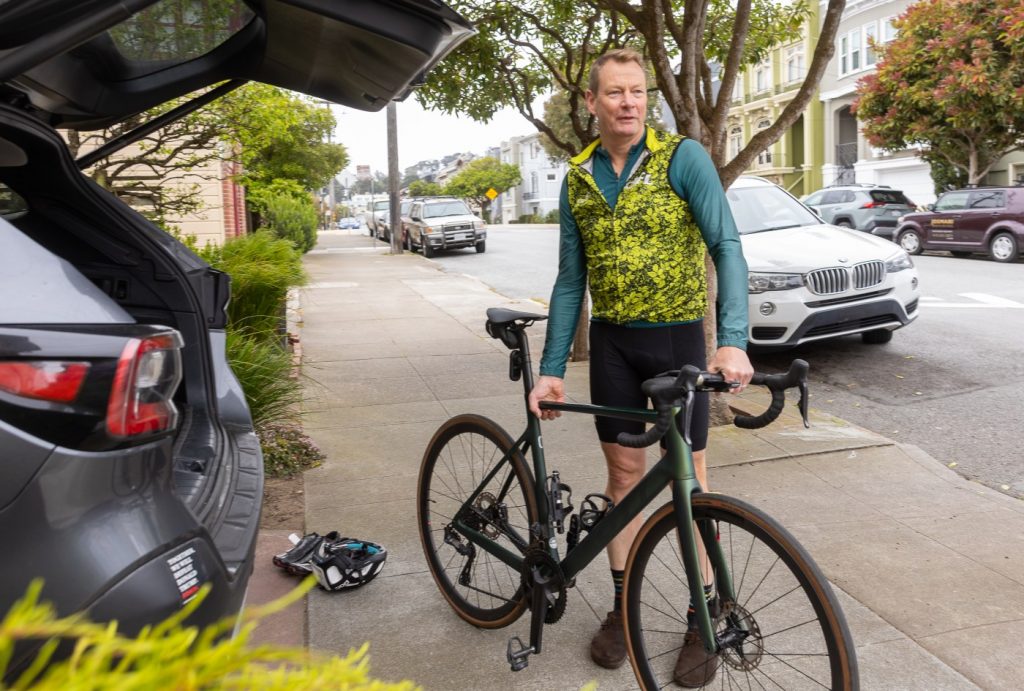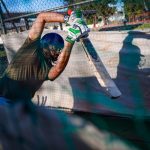Lennart van den Ende, an avid cyclist and product leader for San Jose technology giant Cisco, was excited to learn that a man who tracks stolen bicycles found the two high-end bikes that a pair of thieves had snatched from his garage a few weeks earlier.
“He sent me an email and said, ‘Hey can we talk? I’ve got some good news for you,’ ” van den Ende recalled.
But Bike Index co-founder Bryan Hance had bad news, too. Hance’s Bay Area-based nonprofit had located the bicycles — a $6,000 Cervelo and a $5,000 Specialized — but the bikes were already in Mexico.
A screen-grab from surveillance video footage showing one of a pair of thieves caught on camera breaking into Lennart van den Ende’s garage in San Francisco, Calif. on Sept. 14, 2020, and stealing two high-end bicycles. (courtesy of Lennart van den Ende)
Van den Ende is one of dozens of Bay Area residents allegedly victimized by a crime ring that operated a stolen-bike pipeline between Silicon Valley and Mexico. An investigation by Hance and Bike Index led to police and FBI probes, and the federal indictment of San Jose transmission shop owner Victoriano Romero earlier this year on charges of allegedly shipping pricey bicycles stolen in the Bay Area — including van den Ende’s — out of the country.
Romero is on bail awaiting trial, but ongoing sales on Facebook of high-end bikes suggest the operation has continued without his alleged participation. Reached by phone at his shop, Tepeke Transmission, Romero hung up when asked by this news organization about the indictment. A lawyer for Romero declined to comment on his case. Romero’s next hearing is scheduled for July 31.
The indictment claims that between April 2020 and April 2021, Romero, 53, knowingly bought stolen bikes, “had the stolen bicycles disassembled and packaged up for delivery at his automotive shop in San Jose,” then had them delivered to a fellow conspirator in Mexico and shared in the profits.
Although the federal charges cover nine bikes worth $3,000 to $9,000, an exposé published this week by Wired magazine identifies Romero’s alleged partner in crime as an amateur bike racer from Jalisco State, whom this news organization is not naming because he has not been charged with a crime. Romero’s indictment describes his alleged Mexican connection as Unindicted Co-Conspirator 1, from the state of Jalisco.
The Wired article lays out a vast scheme that saw large numbers of expensive bikes stolen from Silicon Valley and elsewhere in the U.S. and sent to the Mexican man, who peddled them on a Facebook page not easily visible to U.S. users.
Hance believes 60 to 100 bikes worth $2,000 to $10,000 have been stolen from Bay Area garages and apartments as part of the operation.
The Mexican man, speaking briefly on the phone, called the accusations against him a lie.
The man’s Facebook page, region-locked and not visible to U.S. users without a virtual private network, showed high-end road and mountain bikes posted for sale as recently as Wednesday.
The page also included a recent note referring to media coverage and saying, “We buy all our bicycles in established and authorized places” such as bike shops, flea markets and pawn shops. “We are not leaving,” the post said.
Bike Index’s investigation began in 2020 with an anonymous tip. The San Francisco-based nonprofit, launched in 2013, has reunited thousands of owners around the world with their stolen bicycles, according to Hance. Theft victims list their lost bikes, with photos.
The tipster reported that a road bike worth $8,000, listed on Bike Index as stolen from a Mountain View apartment two weeks earlier, had shown up for sale on a Mexico-based Facebook page for a very low price. On that page were other fancy bikes available for purchase at bargain-basement prices, including one from Santa Clara, another from San Jose, and a rare white mountain bike from the Ugandan brand Gorilla.
Most of the bikes from the Bay Area were taken in late 2020 and 2021, Hance said. It was September 2020 when van den Ende’s daughter went into the garage and saw empty spaces where his two bikes had hung from the ceiling by their front wheels.
Playing back the home’s surveillance video, van den Ende saw two thieves in hoodies arriving around 2 a.m. the night before. They had the bikes out “within seconds,” van den Ende said. He had a half dozen bikes in the garage, but those two were the only valuable ones, he said.
Related Articles
Suspect in Saratoga liquor store robbery arrested
Free press advocates urge DA not to charge Stanford reporter arrested with university protesters
Two arrested in attack on San Jose police car after sideshow
Lawsuit: San Jose school district covered up convicted teacher’s abuse of students
Visionary behind innovative Santa Clara County jail program honored with national award
On Valentine’s Day in 2021, Hance was checking the Mexican man’s Facebook page and saw that in an apparent misstep, a screengrab from a smartphone had been posted, showing a photo album named “Victoriano.” Hance soon found the man had a Facebook friend named Victor Romero, who ran Tepeke Transmission in San Jose and whose full first name was Victoriano.
The Bike Index investigation matched photos of bicycles for sale on the Mexican man’s Facebook page — with the bikes leaned against walls and doors — to photos on the Facebook page for Tepeke Transmission that showed interior and exterior spaces at the shop, Hance said.
“Same wall, same door, same color,” Hance said. One of the stolen-bike photos even contained an orange rack like one in Romero’s shop, complete with visible transmission housings. According to Romero’s indictment, he had taken photos of stolen bikes and texted them to his co-conspirator who would “advertise (them) for sale in Mexico on his Facebook sales page.”
Hance began calling and emailing police all over the Bay Area, he said. Almost all departments said they could not expend resources on a case involving Mexico, but information Hance gave to San Francisco police drew action.
San Francisco’s department said they served a search warrant at the man’s shop in San Jose in April 2021 and “found one of the stolen bicycles disassembled and ready for transport to Jalisco, Mexico.”
Hance said he was disappointed the indictment only implicated Romero and listed only nine bikes.
U.S. Department of Justice spokesman Abraham Simmons said the federal probe into Romero’s alleged crimes continues. He would not say whether any other people were targeted.
Meta declined to answer questions from this news organization about its response to Bike Index’s reports to the company about stolen bicycles on Facebook. The Menlo Park social media giant said it prohibits buying or selling stolen goods and that anyone who believes they see stolen items on its Facebook Marketplace should report it on the platform.


